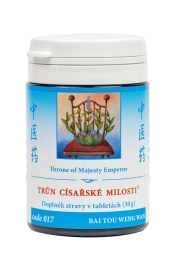
- Shu di huang (Prepared Chinese Foxglove Root)
- Dan zhu ye (Bamboo Leaves and Stem)
- Fu ling (Hoelen)
- Hua shi (Talcum)
- Mang xiao (Glauber’s Salt)
- Tong cao (Tetrapanax)
- Zhi zi (Cape Jasmine Fruit)
- Zhi gan cao (Licorice Root)
- Microcrystalline cellulose (MCC) 1%
Affects based on the TCM:
- Excludes hot toxin RE DU from the intestines
- Cools blood RE XUE
- Stops diarrhoea
Usage:
- Chronic and acute diarrhoea (salmonellosis, shigellosis, adenoviruses …)
- Crohn’s disease or ulcerative colitis
- Hemorrhoids
- Parasitic diseases with diarrhoea (amoebas)
Description according to traditional Chinese medicine: This is a modification of the original traditional Chinese herbal mixture BAI TOU WEN WAN, adjusted to meet today’s needs. Civilization diseases, hard to treat with Western medicine, are growing in appearance in the Western societies because of stress and poor lifestyle. They also include Crohn’s disease or ulcerative colitis, which are chronic inflammations of the large and small intestine, manifested by repeated diarrhoea with mucous or bloody stools, sometimes purulent, abdominal pain, annoying feeling of urge to stool or burning in the rectum. According to Chinese medicine, these difficulties are caused by hot toxin RE DU accumulated in the intestine which slowly destroys this area. The treatment then consists of eliminating “hot toxin RE DU” from the organism, cooling down blood and calming down diarrhoeal pain. It is often combined with the herbal mixture Drying up the Rice Terraces (code 021) and with breakfast it is always recommended to drink the Beverage of Chinese Sages (code 900).
Packaging: 100 tablets / 30 g (100% natural, natural cellulose max. 1% is the only binding agent; made from concentrated herbs at a ratio of 5:1, i.e. 5 g of dried herbs are used per gram of herbal tablets)

- Shu di huang (Prepared Chinese Foxglove Root)
- Dan zhu ye (Bamboo Leaves and Stem)
- Fu ling (Hoelen)
- Hua shi (Talcum)
- Mang xiao (Glauber’s Salt)
- Tong cao (Tetrapanax)
- Zhi zi (Cape Jasmine Fruit)
- Zhi gan cao (Licorice Root)
- Microcrystalline cellulose (MCC) 1%
Each batch of our herbal products is tested in the accredited Phytax laboratory for medicines in Schlieren (Switzerland). This testing identifies herbs, but also heavy metals (mercury, cadmium, lead, arsenic, and copper), bacteria (E. coli, salmonella, total number of bacteria), mould, yeasts and aflatoxins. TCM Herbs is the only supplier in Europe that tests each batch of herbs for all its herbal tablets. Among other things, the herbal products are tested for 511 types of pesticides (4 groups). This is because pesticides have become a worldwide problem, especially in products from the so-called third world. Customers buy herbal products in the belief that they are completely natural, but often these products are “contaminated” with other undesirable “chemicals”.
The herbal tablets and beverages from our company (TCM Herbs) are the only ones in Europe to have been additionally tested. Among others, our products are tested for 511 pesticides — and this number is continuously increasing due to the use of new pesticides. Pesticides are now becoming a global problem! Such a range of checks on pesticides cannot even be detected in laboratories in Europe. Neither is anyone testing it, because unfortunately European legislation does not require these examinations. This comprehensive testing of each batch, and each herb beyond the normal examinations does require considerable financial costs, but the quality of herbs and safety of our products is our absolute priority.
Laboratories are different
A certified laboratory for food supplements is obliged to examine the presence of heavy metals, fungi, and bacteria. However it only determines a smaller range of pesticides and its requirements for their quality content in herbs are lower.
On the other hand, a certified laboratory for medicines also identifies individual herbs and, in particular, tests the entire range of pesticides (at least 500 types) and has higher requirements for the quality in herbs. In the EU, there are only a few laboratories like that and the prices for their services are rightly high. Today, it is therefore very important to know which laboratory tests the dietary supplement and what the tests are focused on; if each batch and each herb are tested, or just a random sample, for how many pesticides, how many added ingredients and how many additional binding agents the product contains, etc. – otherwise consumers could be easily deceived and disappointed (you can find more details at Safety and Quality of TCM Herbs Products).
All our herbal products are tested in a certified laboratory for medicines.
The above information implies that herbal tablets and drinks of TCM Herbs are, in terms of quantity (concentration of herbs in the mixture is 5 times higher, i.e. 1 g of a herbal tablet equals 5 g of raw herbs) and quality (unprecedented testing of each batch), among the best products we can imagine and enjoy in terms of today’s natural medicines.

